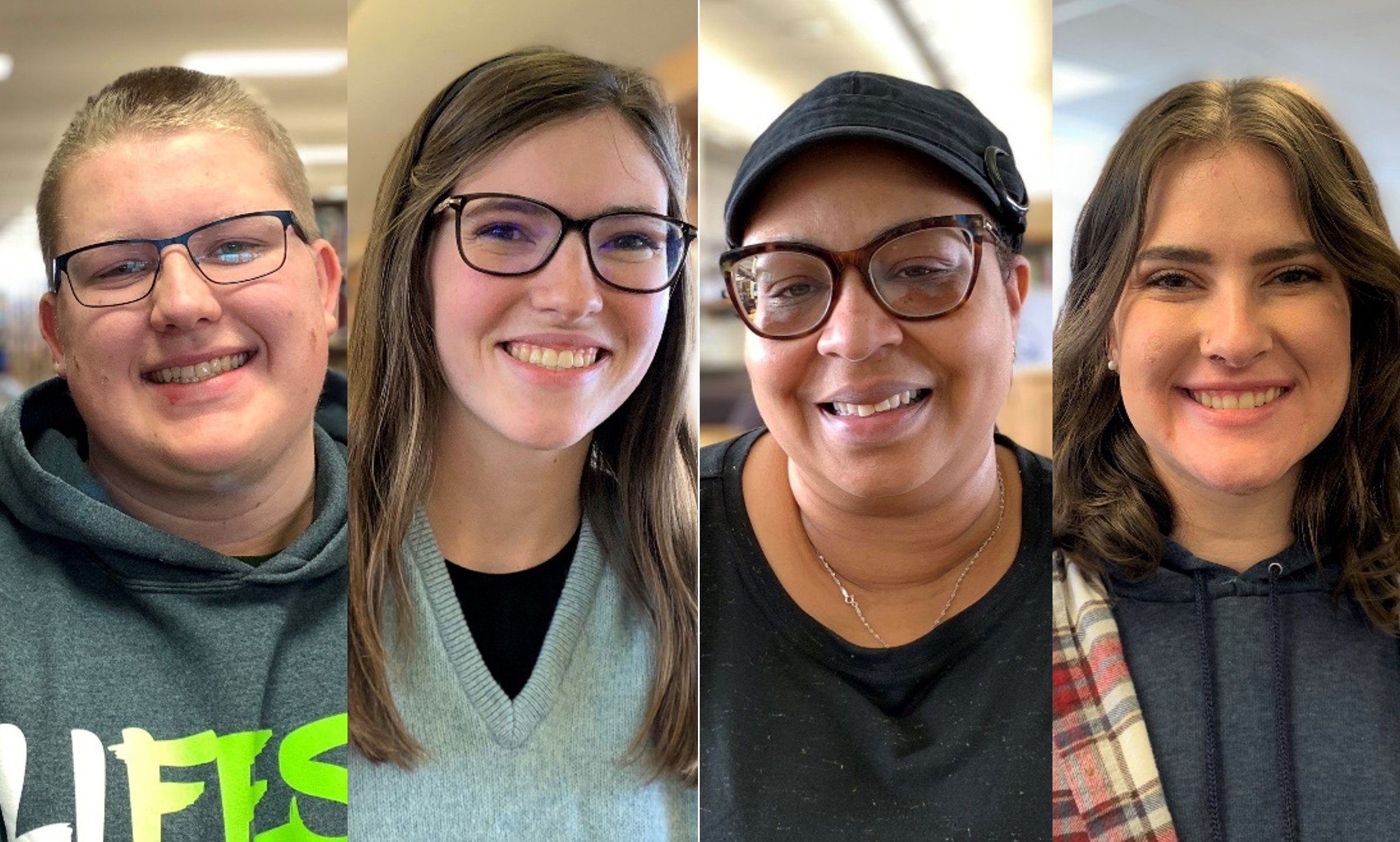
With several new services launching this semester, the Academic Resource Centers are better places to get help—or provide it—than ever.
It may just be the best kept secret on the Concordia University Wisconsin and Ann Arbor campuses: the Academic Resource Center offers a wide range of services designed to help students get ahead. Whether you’re struggling and need some assistance or just want to get out ahead of things and stay there, the A.R.C. is here to help with personalized assistance.
“We have a wide range of services available to students, no matter where they are on their academic journey,” says Jan Chapman, director of the Academic Resource Center and Accessibility Services. “When a student comes in for help, we make sure to match them with just the right kind of assistance.”
“Often, just getting students in the door is the hardest part,” adds Academic Support Specialist Elizabeth Kirk. “Maybe they just don’t know about it. Because once students come in, they almost always come back.”
Perhaps the best part is that all these services are absolutely FREE to students. All you have to do to get started is drop in (LU200 ), visit the website for more information, or log in to your student portal to set up an appointment.
What’s new
- New A.R.C. leadership: The A.R.C. is pleased to introduce Kim Bentley, the new assistant director of the A.R.C. on the Ann Arbor campus. She joins Earl Schumake, academic support specialist, Kaylee Tucker, writing center coordinator, and Ashley Spiegelberg, Testing Center coordinator, to give students at CUAA stronger academic resources than ever.
- Adult Literacy Center partnership: The CUW A.R.C. is pleased to announce a new partnership with the Adult Literacy Center of Ozaukee County. Two days a week, volunteers from the center come to the CUW campus to work with international students on their English speaking and writing skills.
- Writing Collaborative: A joint effort of Eric Adams, the A.R.C. Writing Center facilitator and adjunct professor of English, and Dr. Stephanie Guedet, associate professor of English, this new program is designed to further strengthen the writing resources available to students on both campuses.
- Graduate students and accelerated programs: Increased focus on and available resources for students beyond the traditional undergraduate track.
What’s ongoing
The new services outlined above are all in addition to the core services that has always made the A.R.C. such a valuable resource for students.
- Peer Tutoring: Learn one-on-one or in a small group setting from outstanding fellow students who have recently completed the class you’re taking.
- Writing Center: Get help from in all aspects of the writing, at any stage of the process, from expert Writing Consultants. In-person or online consultations, by appointment, for individuals or small groups.
- Math Drop-in Desk: Free tutoring for most 100-200 level classes (and some 300-400 level) on a drop-in basis in the Library. You can even get math help for finance/business or science courses.
- Supplemental Instruction: Small group instruction led by students who’ve successfully completed the same course you’re taking, with the same professor.
- Peer Academic Coaches (P.A.C.): Learn the ins and outs of how to be a better student—including how to adapt to campus life—from peer mentors who know how to get things done.
- Bridge program: Working with Admissions to get incoming students who need extra help transitioning into college some assistance right away.
- Accessibility Services: Support for those who need it to enable equal access to an education, to university life, and to accessible educational environments.
Who’s onboard
Meet four students who are either taking advantage of or helping to provide A.R.C. services — or both!
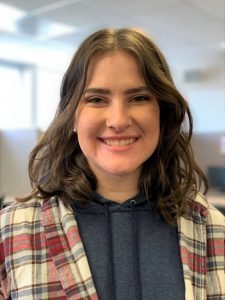
Martha “Marty” Knurr
Doctor of Physical Therapy program, 2nd year
Even though she’s always been a good student, Marty has long appreciated the value of tutoring. At the junior college she attended after high school, seeking some extra help, she says, was almost expected. When she moved on to a large university to finish her bachelor’s degree, she found support available, but not as easy to access.
After she enrolled at Concordia in the Doctor of Physical Therapy program, she appreciated the more personal atmosphere of the smaller campus and was eager to help others by becoming a Peer Academic Coach. “I always tell people that being a P.A.C. is about teaching you how to be a good student,” Marty explains. “How to manage your time better, how to prioritize things, how to study more efficiently, maybe even how to use Google more effectively. Things like that.”
One piece of advice she would give to students thinking about visiting the A.R.C. is to not make the mistake of thinking that only struggling students can benefit from the services. “No one is going to think that you’re a bad student because you’re seeking help,” Marty says. “If anything, they’ll see that you’re a proactive student, and thinking in terms of getting out ahead of any problems. These resources are there for you; you might as well use them.”
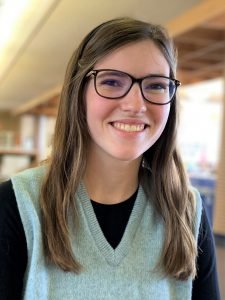
Payton Godbold
Master of Occupational Therapy program, Accelerated Track, 3rd year
A self-described “anatomy nerd,” Payton has found a perfect fit as a Supplemental Instructor (S.I.) for basic anatomy with Assistant Professor Dr. Joe Fisher. As a freshman, she aced the class with the help of Supplemental Instruction, so it felt right to return the favor by helping others.
“Anatomy can be a really hard class,” Payton says. “It was hard for me too, but sometimes people really struggle with it, so I’m glad we can be there to support and help them through it. Especially as a freshman, when I was transitioning into college, having that extra support definitely helped me figure everything out.
“One thing I think would be really cool is to be a professor someday,” she adds. “And this helped show me that I am capable of teaching other people, and that I like being in that setting. Because I really have fun interacting with and getting to know the students. It’s nice to get to know the freshmen, and help support them as an S.I., because that’s something I needed and was really helpful when I was a freshman.”
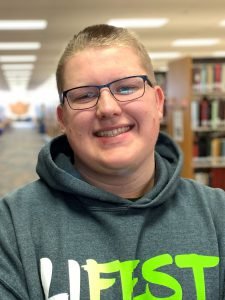
Adam Kuglitsch (’23)
Sport and Entertainment Business
When Adam first enrolled at CUW, he felt a little overwhelmed. Diagnosed with a reading comprehension disability in grade school, he knew he would need a little extra help to succeed. Fortunately, he knew right where to go to get it. Now in his junior year, Adam has become a highly successful student looking forward to a rewarding career in the sports industry.
“The A.R.C. has been great for me,” explains Adam, who also has learned to deal with test anxiety. “I’ve used the tutoring, I’ve used the Peer Academic Coaches, I’ve used the Writing Center, I’ve used the Math Drop-in Desk—all these great things the A.R.C. provides.
“In particular, the P.A.C.s have got me through a lot,” he says. “I’ve had some really good coaches who’ve helped guide me through the school week, help me with papers I’m working on, basically whatever I’m working on, they can help me with. It can be a difficult job, and I really respect everyone who does it.”
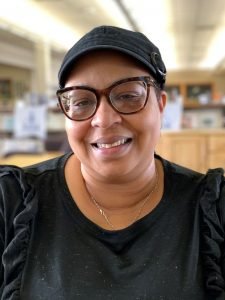 Royshell Russ (’24)
Royshell Russ (’24)
Nursing
When Royshell restarted her Concordia education after raising her children, with an eye on pursuing a nursing degree, things didn’t go so well at first. In fact, after two semesters she found herself heading toward academic dismissal. Then the A.R.C. helped her find her way back to success.
“I felt like I was drowning, and I just wanted help,” she explains. “So I had a meeting with the A.R.C. Jan and Kathy [Hoppa Grady, support services coordinator] were there, one of my professors was there, another one wrote a letter. They just walked me through all the help that was available, got me signed up for everything, it was awesome!”
From there things started to really take off. Royshell took advantage of tutoring, Supplemental Instruction, and even the Testing Center for some of the test anxiety she was feeling. She had been a little worried that she might feel singled out, especially as an older adult student, but never felt anything but love and acceptance.
“I’ve always enjoyed school, being in a learning environment,” she says. “And now I’m enjoying it again. To anyone who’s thinking about using the A.R.C., I would say, ‘Do not hesitate!’ If you want to do better in your classes, definitely do it. It’s made a big difference for me.”
For more information about all the services available through the Academic Resource Center, visit your campus website, cuw.edu or cuaa.edu.
— This story is written by Mike Zimmerman, corporate communications manager for Concordia University Wisconsin. He may be reached at michael.zimmerman@cuw.edu or 262-243-4380.
If this story has inspired you, why not explore how you can help further Concordia's mission through giving.